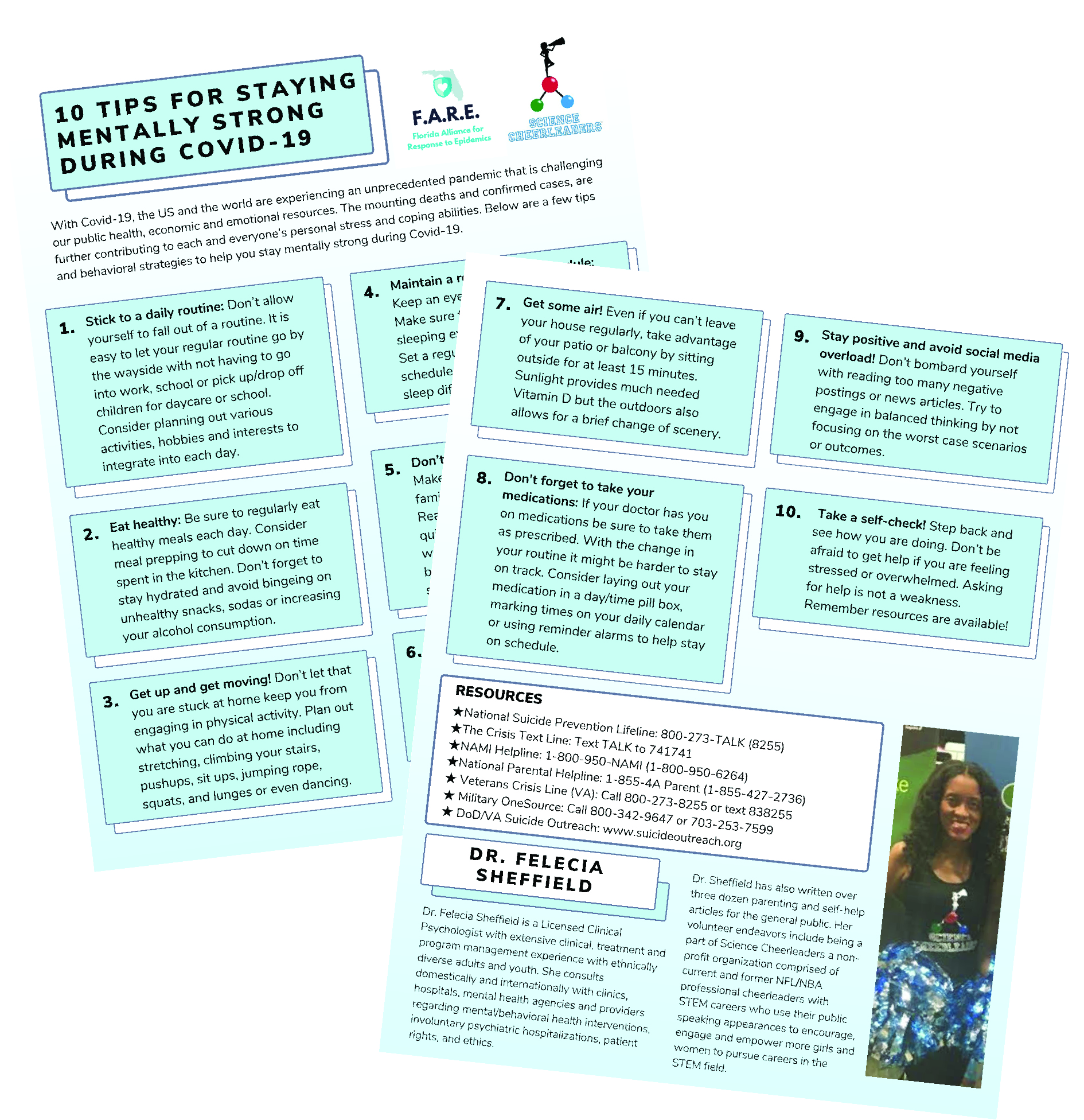
In partnership with FARE (the Florida Alliance for Response to Epidemics) and the UF-VA UNESCO Bioethics Unit at the University of Florida Department of Psychiatry, we’re bringing you COVID-19 Awareness Week! Science Cheerleader Dr. Felecia is back to give 10 tips for staying mentally strong during COVID-19.
In addition to being a former Miami Dolphins cheerleader, Science Cheerleader is Dr. Felecia Sheffield is a Licensed Clinical Psychologist with extensive clinical, treatment and program management experience with ethnically diverse adults and youth. She consults domestically and internationally with clinics, hospitals, mental health agencies and providers regarding mental/behavioral health interventions, involuntary psychiatric hospitalizations, patient rights, and ethics. She has also written over three dozen parenting and self-help articles for the general public.

1. Stick to a daily routine:
Don’t allow yourself to fall out of a routine. It is easy to let your regular routine go by the wayside with not having to go into work, school or pick up/drop off children for daycare or school. Consider planning out various
activities, hobbies and interests to
integrate into each day.
2. Eat healthy:
Be sure to regularly eat healthy meals each day. Consider meal prepping to cut down on time spent in the kitchen. Don’t forget to stay hydrated and avoid bingeing on unhealthy snacks, sodas or increasing your alcohol consumption.
3. Get up and get moving!
Don’t let that you are stuck at home keep you from engaging in physical activity. Plan out what you can do at home including stretching, climbing your stairs, pushups, sit ups, jumping rope, squats, and lunges or even dancing.
4. Maintain a regular sleep schedule:
Keep an eye on your sleep behavior. Make sure that you don’t start sleeping excessively out of boredom. Set a regular wake up and bedtime schedule to minimize developing sleep difficulties.
5. Don’t ghost your support system!
Make sure to stay connected to your family, friends, or spirituals supports. Reach out with a brief phone call, quick text or email. These are all great ways to check in, maintain strong bonds and get/give support.
6. Schedule some alone time:
With jobs and school being temporarily closed it is easy to not find any alone time. Be sure to try and carve out even 30 minutes a day to allow yourself to rejuvenate
7. Get some air!
Even if you can’t leave your house regularly, take advantage of your patio or balcony by sitting outside for at least 15 minutes. Sunlight provides much needed Vitamin D but the outdoors also allows for a brief change of scenery
8. Don’t forget to take your medications:
If your doctor has you on medications be sure to take them as prescribed. With the change in your routine it might be harder to stay on track. Consider laying out your medication in a day/time pill box, marking times on your daily calendar or using reminder alarms to help stay on schedule
9. Stay positive and avoid social media overload!
Don’t bombard yourself with reading too many negative postings or news articles. Try to engage in balanced thinking by not focusing on the worst case scenarios or outcomes
10. Take a self-check!
Step back and see how you are doing. Don’t be afraid to get help if you are feeling stressed or overwhelmed. Asking for help is not a weakness. Remember resources are available
Important Resources
National Suicide Prevention Lifeline: 800-273-TALK (8255)
The Crisis Text Line: Text TALK to 741741
NAMI Helpline: 1-800-950-NAMI (1-800-950-6264)
National Parental Helpline: 1-855-4A Parent (1-855-427-2736)
Veterans Crisis Line (VA): Call 800-273-8255 or text 838255
Military OneSource: Call 800-342-9647 or 703-253-7599
DoD/VA Suicide Outreach: www.suicideoutreach.org
